倒装句讲解
倒装句讲解

“Where
is your father?” “Oh, A. here comes he B. here does he come C. he here comes D. here he comes
.”
课堂小结
部分倒装 全部倒装
ho地点状语的介词短语放在句首。主语是 名词。一般使用完全倒装结构。 注:如果主语是代词则用正常语序。 In the middle of the room stood a little girl. 在房间中央站着一个小女孩。 In the distance was a horse.马在远处。
exercises
. On
the wall two large portraits. A. hangs B. hang C. hanged D. are hanging
______the plane. A. Flew down B. Down flew C. Down was flying D. Down flying
倒装
英语的基本语序是“主语+谓语”。
如果将谓语的全部或一部分放在主 语之前,这种语序称为“倒装”。 倒装的原因,一是语法结构的需要, 二是为了强调
倒装的类型 完全倒装 整个谓语移至主语之前。 Out rushed the students to welcome the foreign friends. 学生们涌出去欢迎外国朋友。
3.____ been asked to sing an English song. A. Never before have I B. Before have I never C. Have never I D. I never have
英语语法 什么是倒装句

英语语法什么是倒装句倒装句是一种特殊的语法结构,在英语语法中有着重要的地位。
正常语序中,主语通常出现在动词之前,而倒装句则将动词或助动词置于主语之前,或者将整个谓语或短语置于主语之前。
这种颠倒的语序在英语中具有特殊的语法和修辞效果,常用于强调、疑问、条件句等语境中。
以下是倒装句的几种常见形式和用法:1. 完全倒装:将助动词或系动词放在主语之前。
例如:- Never have I seen such a beautiful sunset.- Only in dreams can we truly fly.2. 部分倒装:将助动词、情态动词或动词的某些部分放在主语之前。
例如:- Hardly had he arrived when the phone rang.- Not only did she finish the report, but she also submitted it early.3. 带有否定词的倒装:将否定词放在句首,然后倒装动词和主语的顺序。
例如:- Never have I felt so alone.- Not until the rain stopped did they go outside.4. 疑问倒装:将助动词或情态动词提到句首,以形成疑问句。
例如:- Is he coming to the party?- Can you speak French?5. 条件句中的倒装:当条件句以介词短语或副词短语开头时,常常使用倒装结构。
例如:- In case of fire, break the glass.- Should you need any assistance, please let us know.倒装句的使用可以使句子更具有强调和修辞效果,增加句子的变化和多样性。
但需要注意的是,倒装句的使用需要根据具体的语境和句子结构来判断,不是所有情况下都适用。
因此,在使用倒装句时,需要注意语法规则和语义逻辑的准确性。
(完整版)倒装句的讲解
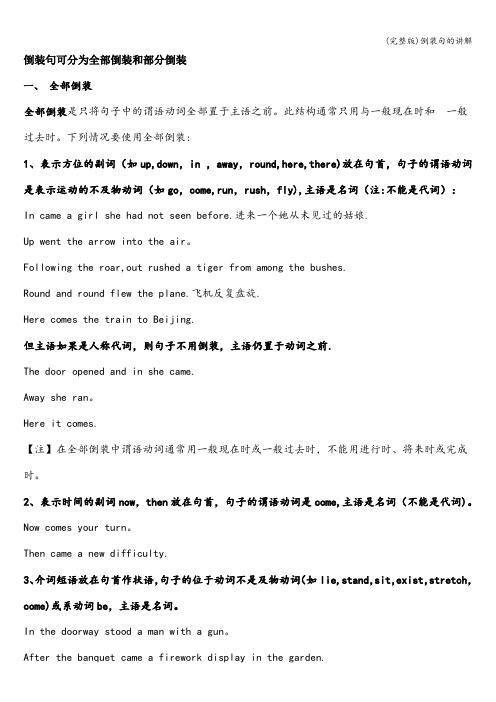
倒装句可分为全部倒装和部分倒装一、全部倒装全部倒装是只将句子中的谓语动词全部置于主语之前。
此结构通常只用与一般现在时和一般过去时。
下列情况要使用全部倒装:1、表示方位的副词(如up,down,in ,away,round,here,there)放在句首,句子的谓语动词是表示运动的不及物动词(如go,come,run,rush,fly),主语是名词(注:不能是代词):In came a girl she had not seen before.进来一个她从未见过的姑娘.Up went the arrow into the air。
Following the roar,out rushed a tiger from among the bushes.Round and round flew the plane.飞机反复盘旋.Here comes the train to Beijing.但主语如果是人称代词,则句子不用倒装,主语仍置于动词之前.The door opened and in she came.Away she ran。
Here it comes.【注】在全部倒装中谓语动词通常用一般现在时或一般过去时,不能用进行时、将来时或完成时。
2、表示时间的副词now,then放在句首,句子的谓语动词是come,主语是名词(不能是代词)。
Now comes your turn。
Then came a new difficulty.3、介词短语放在句首作状语,句子的位于动词不是及物动词(如lie,stand,sit,exist,stretch,come)或系动词be,主语是名词。
In the doorway stood a man with a gun。
After the banquet came a firework display in the garden.On the moon, as is known to all,exists no living thing。
倒装句讲解

倒装句讲解什么是倒装句?倒装句是英语中一种语法结构,常用于强调句子的某个成分、改变语序或与上下文形成对比。
正常的语序是主语在前,谓语动词在后,而倒装句则将谓语动词或助动词置于主语之前,从而形成倒装的结构。
倒装句在英语中使用较为频繁,掌握倒装结构对于理解和运用英语句子具有重要意义。
倒装句的分类根据倒装的形式和用途,倒装句可以分为以下几种类型:1.完全倒装句:将整个谓语动词或助动词短语置于主语之前,没有任何修饰成分。
例子:Up flew the birds at the sound of the gunshot.(枪声一响,鸟儿们立刻飞起来了。
)2.部分倒装句:只将谓语动词的一部分(常为助动词或情态动词)置于主语之前。
例子:Never have I seen such a beautiful sunset before.(我以前从未见过如此美丽的日落。
)3.介词短语倒装句:在以介词短语引导的状语从句或时间、地点状语前,将主谓语倒装。
例子:In the garden sat a little girl, lost in her own thoughts.(花园里坐着一个小女孩,陷入了自己的思考。
)倒装句的用法倒装句的主要用途有以下几种:1.强调句子的某个成分:通过倒装结构将被强调的成分置于句首,使其更加突出。
例子:Only in this way can we achieve our goals.(只有通过这种方式,我们才能实现我们的目标。
)2.改变语序:某些表示否定、半否定或者只有部分意义的词语或短语需要使用倒装句来构成正确的语序。
例子:On no condition should you touch the red button.(无论如何你都不能碰那个红色按钮。
)3.与上下文形成对比:有时候为了与上文形成对比,需要使用倒装结构。
例子:John went by bus, while his sister went by train.(约翰坐公共汽车去了,而他的姐姐则乘火车去了。
【倒装句】小学语文倒装句讲解
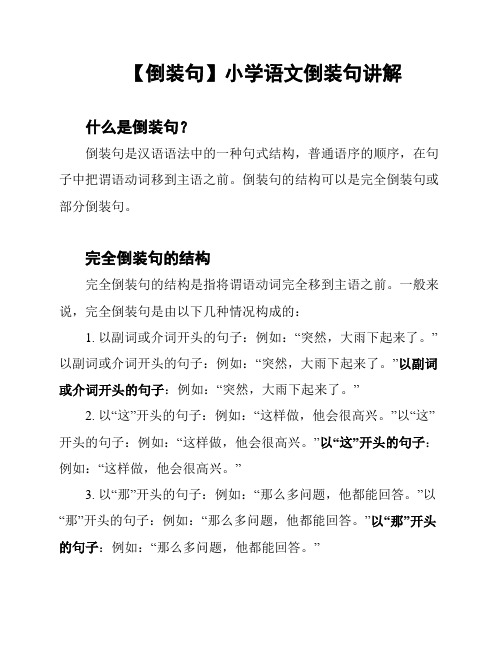
【倒装句】小学语文倒装句讲解什么是倒装句?倒装句是汉语语法中的一种句式结构,普通语序的顺序,在句子中把谓语动词移到主语之前。
倒装句的结构可以是完全倒装句或部分倒装句。
完全倒装句的结构完全倒装句的结构是指将谓语动词完全移到主语之前。
一般来说,完全倒装句是由以下几种情况构成的:1. 以副词或介词开头的句子:例如:“突然,大雨下起来了。
”以副词或介词开头的句子:例如:“突然,大雨下起来了。
”以副词或介词开头的句子:例如:“突然,大雨下起来了。
”2. 以“这”开头的句子:例如:“这样做,他会很高兴。
”以“这”开头的句子:例如:“这样做,他会很高兴。
”以“这”开头的句子:例如:“这样做,他会很高兴。
”3. 以“那”开头的句子:例如:“那么多问题,他都能回答。
”以“那”开头的句子:例如:“那么多问题,他都能回答。
”以“那”开头的句子:例如:“那么多问题,他都能回答。
”4. 以“只有”开头的句子:例如:“只有努力研究,才能取得好成绩。
”以“只有”开头的句子:例如:“只有努力研究,才能取得好成绩。
”以“只有”开头的句子:例如:“只有努力学习,才能取得好成绩。
”5. 以表示否定意义的副词或短语开头的句子:例如:“决不言弃,他继续努力。
”以表示否定意义的副词或短语开头的句子:例如:“决不言弃,他继续努力。
”以表示否定意义的副词或短语开头的句子:例如:“决不言弃,他继续努力。
”6. 以表示“愿望、祝福、希望”等情感的词语开头的句子:例如:“祝你生日快乐!”以表示“愿望、祝福、希望”等情感的词语开头的句子:例如:“祝你生日快乐!”以表示“愿望、祝福、希望”等情感的词语开头的句子:例如:“祝你生日快乐!”7. 以表示“虽然、尽管”等连接词开头的句子:例如:“虽然下雪,但是他没有穿外套。
”以表示“虽然、尽管”等连接词开头的句子:例如:“虽然下雪,但是他没有穿外套。
”以表示“虽然、尽管”等连接词开头的句子:例如:“虽然下雪,但是他没有穿外套。
英语倒装句详解及练习
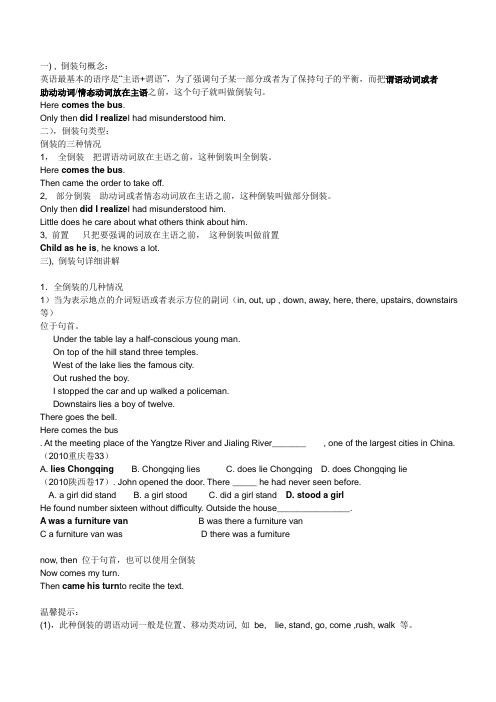
一) , 倒装句概念:英语最基本的语序是“主语+谓语”,为了强调句子某一部分或者为了保持句子的平衡,而把谓语动词或者助动动词/情态动词放在主语之前,这个句子就叫做倒装句。
Here comes the bus.Only then did I realize I had misunderstood him.二),倒装句类型:倒装的三种情况1,全倒装把谓语动词放在主语之前,这种倒装叫全倒装。
Here comes the bus.Then came the order to take off.2, 部分倒装助动词或者情态动词放在主语之前,这种倒装叫做部分倒装。
Only then did I realize I had misunderstood him.Little does he care about what others think about him.3, 前置只把要强调的词放在主语之前,这种倒装叫做前置Child as he is, he knows a lot.三), 倒装句详细讲解1.全倒装的几种情况1)当为表示地点的介词短语或者表示方位的副词(in, out, up , down, away, here, there, upstairs, downstairs 等)位于句首。
Under the table lay a half-conscious young man.On top of the hill stand three temples.West of the lake lies the famous city.Out rushed the boy.I stopped the car and up walked a policeman.Downstairs lies a boy of twelve.There goes the bell.Here comes the bus. At the meeting place of the Yangtze River and Jialing River_______ , one of the largest cities in China. (2010重庆卷33)A. lies ChongqingB. Chongqing liesC. does lie ChongqingD. does Chongqing lie(2010陕西卷17). John opened the door. There _____ he had never seen before.A. a girl did standB. a girl stoodC. did a girl standD. stood a girlHe found number sixteen without difficulty. Outside the house_______________.A was a furniture vanB was there a furniture vanC a furniture van wasD there was a furniturenow, then 位于句首,也可以使用全倒装Now comes my turn.Then came his turn to recite the text.温馨提示:(1),此种倒装的谓语动词一般是位置、移动类动词, 如be, lie, stand, go, come ,rush, walk 等。
倒装句语法讲解
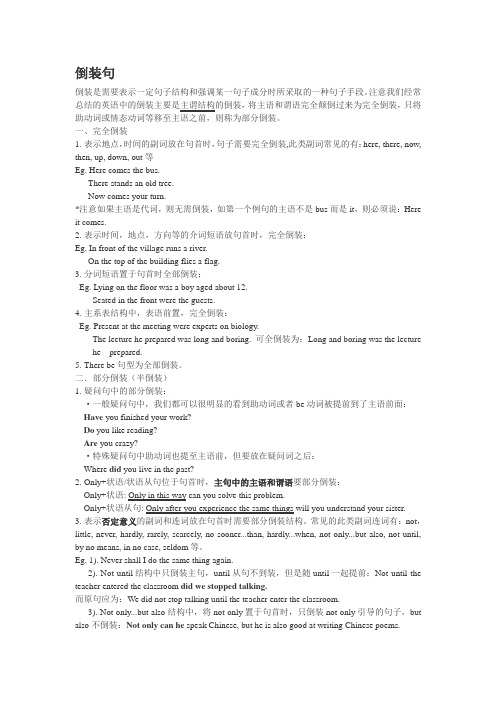
倒装句倒装是需要表示一定句子结构和强调某一句子成分时所采取的一种句子手段。
注意我们经常总结的英语中的倒装主要是主谓结构的倒装,将主语和谓语完全颠倒过来为完全倒装,只将助动词或情态动词等移至主语之前,则称为部分倒装。
一、完全倒装1.表示地点,时间的副词放在句首时,句子需要完全倒装,此类副词常见的有:here, there, now, then, up, down, out等Eg. Here comes the bus.There stands an old tree.Now comes your turn.*注意如果主语是代词,则无需倒装,如第一个例句的主语不是bus而是it,则必须说:Here it comes.2.表示时间,地点,方向等的介词短语放句首时,完全倒装:Eg. In front of the village runs a river.On the top of the building flies a flag.3.分词短语置于句首时全部倒装:Eg. Lying on the floor was a boy aged about 12.Seated in the front were the guests.4.主系表结构中,表语前置,完全倒装:Eg. Present at the meeting were experts on biology.The lecture he prepared was long and boring. 可全倒装为:Long and boring was the lecture he prepared.5.There be句型为全部倒装。
二.部分倒装(半倒装)1.疑问句中的部分倒装:·一般疑问句中,我们都可以很明显的看到助动词或者be动词被提前到了主语前面:Have you finished your work?Do you like reading?-Are you crazy?·特殊疑问句中助动词也提至主语前,但要放在疑问词之后:Where did you live in the past?2.Only+状语/状语从句位于句首时,主句中的主语和谓语要部分倒装:Only+状语: Only in this way can you solve this problem.Only+状语从句: Only after you experience the same things will you understand your sister.3.表示否定意义的副词和连词放在句首时需要部分倒装结构。
倒装句详解ppt课件
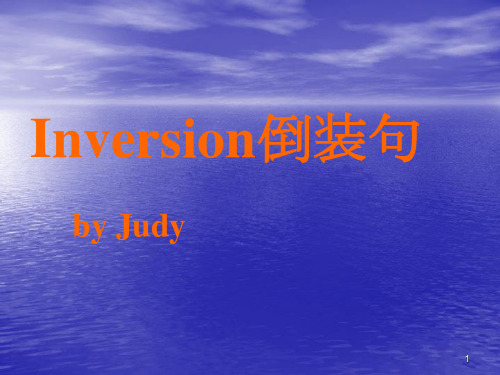
five years ago.(live)
2、有时为了突出或强调主语,可用“表语+系动词+
主语”的完全倒装结构。
(3) ________ are the days when teachers were looked
Here you are ! Out they went.
辨 1.Here you are.
1'
别 2.There comes she.
正 误
3.In came the teacher .
4.In came he.
There ________. And here ________. 2'
A. goes the phone; she comes
__b_u__t _a_l_s_o__m__a_k_e_s__u_s__r_e_la__x_e_d_.___________________
归纳:英语的正常语序是“_主_语_ + _谓_语_”。 即主语在_前_,
谓语在_后_。 有时由于句子结构的需要或表示强调,就要采用
_倒_装_形式。将谓语动词完全移到主语之前称为_全_部_倒装;
Inversion倒装句
by Judy
1
Read, change the order and discover the rule
1' 1. Out rushed the children.T_h__e_c__h_i_ld_r_e_n__r_u_s_h__ce_od_m_op_u_let_.t_e_
3. _A_t_t_h_e_f_o_o_t_o_f_t_h_e__h_il_l _s_ta_n_d__s (坐落于山脚下)
倒装句讲解ppt

Never have I seen such a beautiful place.
倒装句的练习题
1 2
练习三
请将下列句子改为倒装句
原句
The more you practice, the better you will become.
3
倒装句
The more you practice, the better you will become.
部分倒装句
定义
只将助动词、情态动词、系动词置于 主语之前,谓语动词仍在主语之后的 倒装。
例子
Never have I seen such a movie.(我 从未看过这样的电影。)
倒装句的语法功能
01
02
03
强调
通过倒装来强调某个部分, 使句子更加突出。
平衡句子结构
在某些情况下,倒装可以 平衡句子的结构,使其更 加和谐。
将宾语放在句首,强调宾语。例如:“那本书,我刚刚读完。”
补语倒装
将补语放在句首,强调补语的状态或结果。例如:“写完了作业,他才去睡觉 。”
倒装句的修饰语和插入语
修饰语倒装
将修饰语放在句首,强调修饰语。例如:“突然,一只小鸟飞过。”
插入语倒装
将插入语放在句首,强调插入语的内容。例如:“说实话,我不太喜欢这部电影 。”
使用倒装句的注意事项
Байду номын сангаас
符合语法规则
使用倒装句时必须符合语 法规则,不能随意颠倒单 词顺序。
强调重点
通过倒装句可以强调某个 词语或句子,使表达更加 生动有力。
避免歧义
使用倒装句时要注意避免 产生歧义,以免影响读者 理解。
避免倒装句使用不当的方法
倒装句讲解
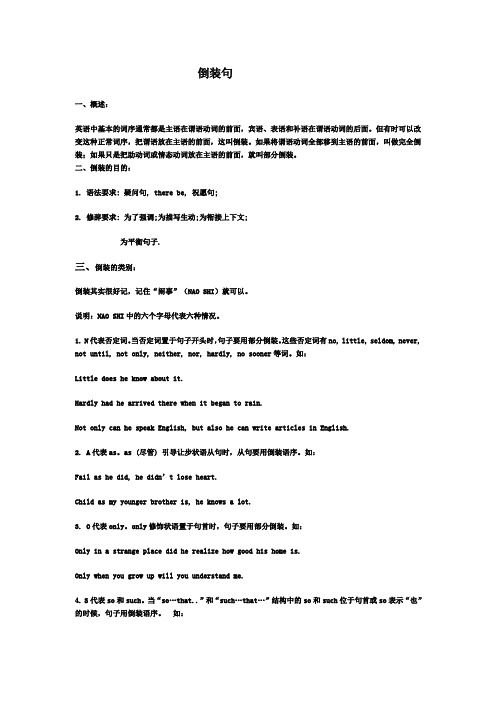
倒装句一、概述:英语中基本的词序通常都是主语在谓语动词的前面,宾语、表语和补语在谓语动词的后面。
但有时可以改变这种正常词序,把谓语放在主语的前面,这叫倒装。
如果将谓语动词全部移到主语的前面,叫做完全倒装;如果只是把助动词或情态动词放在主语的前面,就叫部分倒装。
二、倒装的目的:1. 语法要求: 疑问句, there be, 祝愿句;2. 修辞要求: 为了强调;为描写生动;为衔接上下文;为平衡句子.三、倒装的类别:倒装其实很好记,记住“闹事”(NAO SHI)就可以。
说明:NAO SHI中的六个字母代表六种情况。
1. N代表否定词。
当否定词置于句子开头时,句子要用部分倒装。
这些否定词有no, little, seldom, never, not until, not only, neither, nor, hardly, no sooner等词。
如:Little does he know about it.Hardly had he arrived there when it began to rain.Not only can he speak English, but also he can write articles in English.2. A代表as。
as (尽管) 引导让步状语从句时,从句要用倒装语序。
如:Fail as he did, he didn’t lose heart.Child as my younger brother is, he knows a lot.3. O代表only。
only修饰状语置于句首时,句子要用部分倒装。
如:Only in a strange place did he realize how good his home is.Only when you grow up will you understand me.4. S代表so和such。
当“so…that..”和“such…that…”结构中的so和such位于句首或so表示“也”的时候,句子用倒装语序。
初中英语2023中考语法知识讲解(倒装句+强调句)
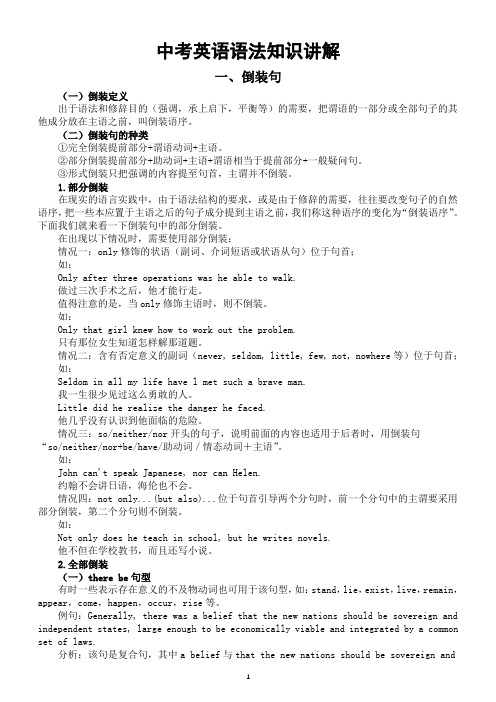
中考英语语法知识讲解一、倒装句(一)倒装定义出于语法和修辞目的(强调,承上启下,平衡等)的需要,把谓语的一部分或全部句子的其他成分放在主语之前,叫倒装语序。
(二)倒装句的种类①完全倒装提前部分+谓语动词+主语。
②部分倒装提前部分+助动词+主语+谓语相当于提前部分+一般疑问句。
③形式倒装只把强调的内容提至句首,主谓并不倒装。
1.部分倒装在现实的语言实践中,由于语法结构的要求,或是由于修辞的需要,往往要改变句子的自然语序,把一些本应置于主语之后的句子成分提到主语之前,我们称这种语序的变化为“倒装语序”。
下面我们就来看一下倒装句中的部分倒装。
在出现以下情况时,需要使用部分倒装:情况一:only修饰的状语(副词、介词短语或状语从句)位于句首;如:Only after three operations was he able to walk.做过三次手术之后,他才能行走。
值得注意的是,当only修饰主语时,则不倒装。
如:Only that girl knew how to work out the problem.只有那位女生知道怎样解那道题。
情况二:含有否定意义的副词(never, seldom, little, few, not, nowhere等)位于句首;如:Seldom in all my life have l met such a brave man.我一生很少见过这么勇敢的人。
Little did he realize the danger he faced.他几乎没有认识到他面临的危险。
情况三:so/neither/nor开头的句子,说明前面的内容也适用于后者时,用倒装句“so/neither/nor+be/have/助动词/情态动词+主语”。
如:John can't speak Japanese, nor can Helen.约翰不会讲日语,海伦也不会。
情况四:not only...(but also)...位于句首引导两个分句时,前一个分句中的主谓要采用部分倒装,第二个分句则不倒装。
倒装句讲解精品PPT课件全文

❖ 7. Only in recent years have women begun to catch up with men in this area.
2)当这些词作形容词修饰主语时且置句首 时,句子不倒装。 Little work was done yesterday.
5.Neither..nor连接的两个句子都要倒装; not only…but also连接的两个句子时, not only后面的句子要倒装, but also不倒装
1)Neither has he called on her, nor will he do so. 2)Not only shall we learn from books,
No sooner had they entered the house than it began to rain.
注意
1)当上述单词不提前时,则不倒装。 I seldom read newspaper before. He had hardly finished his homework when the light went out.
一、完全倒装
1. 在there, here 引导的句子中,谓语是 be, exist, live,lie 等表示状态的不及 物动词。
There is nobody in the classroom. There seems something wrong with my radio. There stands a temple on the top of the mountain.
倒装句经典讲解

形式主语倒装句
将形式主语放在句首,强 调整个句子所描述的对象。
倒装句的语法结构
倒装句的语法结构通常由主语、谓语 和其他修饰成分组成,但这些成分的 顺序与常规顺序不同。
在部分倒装句中,只有谓语的一部分 与主语的位置颠倒,其他成分如宾语、 状语等保持正常顺序。
在完全倒装句中,谓语和主语的位置 颠倒,其他成分如宾语、状语等保持 正常顺序。
倒装句在语法功能上与正常语序有所 不同,如疑问句“谁在门口?”使用 倒装语序。
强调重点不同
倒装句通过改变语序来强调某个词语 或短语,如“她走了进来”强调“她 ”而不是“走进来”。
倒装句与正常语序的联系
倒装句是对正常语序的一种变异
01
倒装句是在正常语序的基础上进行变化,保持句子基本结构和
语法功能不变。
练习题三:翻译题
总结词
培养语境感知
详细描述
在特定的语境中运用倒装句进行翻译,有助于学生更好地理解倒装句在不同语境中的运 用,培养语境感知能力。
THANKS FOR WATCHING
感谢您的观看
表达不当
在使用倒装句时,需注意避免表达不当,以免造成误解或降 低语句质量。
06 练习与巩固
练习题一:选择题
总结词
考察基础概念
详细描述
选择题主要测试学生对倒装句基本概念的理解,包括倒装句的分类、使用条件等。
练习题二:改错题
总结词
提高应用能力
详细描述提高实际 应用能力。
根据句子所表达的语法功能,如疑问、陈述、感叹等,来判断是否 使用了倒装句。
根据语境和表达效果判断
结合语境和表达效果,判断句子是否使用了倒装句来增强表达效果。
05 如何正确使用倒装句
英语倒装句讲解
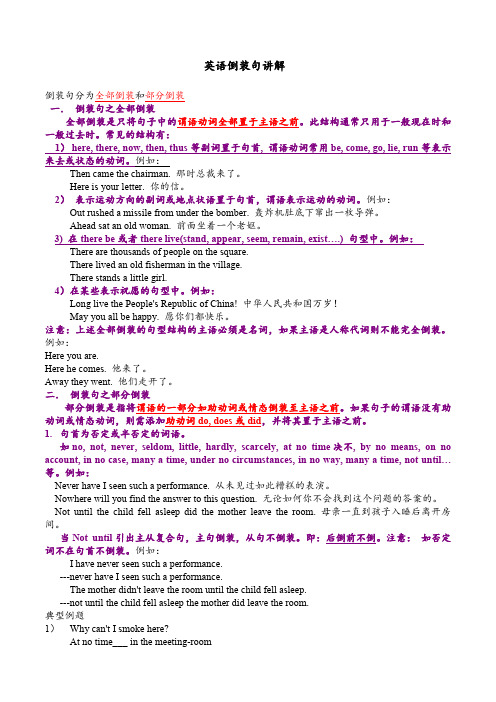
英语倒装句讲解倒装句分为全部倒装和部分倒装一.倒装句之全部倒装全部倒装是只将句子中的谓语动词全部置于主语之前。
此结构通常只用于一般现在时和一般过去时。
常见的结构有:1)here, there, now, then, thus等副词置于句首, 谓语动词常用be, come, go, lie, run等表示来去或状态的动词。
例如:Then came the chairman. 那时总裁来了。
Here is your letter. 你的信。
2)表示运动方向的副词或地点状语置于句首,谓语表示运动的动词。
例如:Out rushed a missile from under the bomber. 轰炸机肚底下窜出一枚导弹。
Ahead sat an old woman. 前面坐着一个老妪。
3) 在there be或者there live(stand, appear, seem, remain, exist….) 句型中。
例如:There are thousands of people on the square.There lived an old fisherman in the village.There stands a little girl.4)在某些表示祝愿的句型中。
例如:Long live the People's Republic of China! 中华人民共和国万岁!May you all be happy. 愿你们都快乐。
注意:上述全部倒装的句型结构的主语必须是名词,如果主语是人称代词则不能完全倒装。
例如:Here you are.Here he comes. 他来了。
Away they went. 他们走开了。
二.倒装句之部分倒装部分倒装是指将谓语的一部分如助动词或情态倒装至主语之前。
如果句子的谓语没有助动词或情态动词,则需添加助动词do, does或did,并将其置于主语之前。
2024年中考英语倒装句详细讲解和讲义

2024英语中考倒装句详细讲解和讲义一、倒装句定义:英语中的倒装语序是一种语法结构,用于强调某些信息、改变语气或满足特定的语言要求。
在英语中,倒装语序有以下几种形式:二、倒装句种类:1.完全倒装:将助动词或情态动词放在主语之前,形成完全倒装。
例如:He is going to the party. →Is he going to the party?They have finished their work. →Have they finished their work?2.部分倒装:将助动词或情态动词与主语之间颠倒顺序,形成部分倒装。
常见的情况包括:否定词位于句首时:Never have I seen such a beautiful sunset.表示地点或方向的介词短语置于句首时:Up the hill ran the children.only 和so 位于句首时:Only when the rain stops will we go for a walk. So beautiful was the sunset that it took my breath away.3.倒装问句:将助动词或情态动词放在句首,形成倒装问句。
例如:Are you going to the party?Can she swim?三、中考常见的倒装句型:1.There be句型的倒装句的具体讲解:定义:"There be" 句型是用来表达存在或出现某人或某物的句子结构。
在倒装语序中,当使用"there be" 句型时,主语"there" 和动词"be" 的顺序被颠倒,即形成了倒装句。
具体讲解如下:(1)肯定句的倒装:在肯定句中,当使用"there be" 句型时,主语"there" 和动词"be" 需要颠倒位置。
倒装句讲解ppt

在虚拟语气中,有时需要将谓语放在主语之前,例如“Were I you, I would go to the party.”(表示与事实相反的情况)。
02
倒装句的用法
完全倒装
定义
将谓语和主语的位置互换,同时把表语和冠词等放在主 语之前。
例子
Here comes the bus.(谓语“comes”放在主语 “the bus”之前)
类型
01
完全倒装
整个谓语和宾语都放在主语之前,例如“Out rushed the boy.”(强
调谓语“rushed”)。
02 03
部分倒装
只有谓语的一部分(如助动词、情态动词等)放在主语之前,例如 “Only in this way can we solve the problem.”(强调介词短语 “in this way”)。
部分倒装
定义
只将助动词、情态动词、be动词等放在主语之前, 而将谓语或表语等保留在主语之后。
例子
Only in this way can we solve the problem. (情态动词“can”放在主语“we”之前)
常见句型
as/though引导的让步状 语从句
no matter引导的让步状语 从句
倒装句讲解
目录
• 什么是倒装句 • 倒装句的用法 • 倒装句与正常语序的区别 • 倒装句的注意事项 • 练习与巩固
倒装句是指句子成分的位置与常规语序不同,通常是为 了强调、突出某个部分或者满足语法规则的需要。
在倒装句中,通常主语、谓语、宾语等句子成分的位置 会颠倒,使得句子的重点或者表达的意思发生变化。
03 平衡句子结构
在某些情况下,为了平衡句子的结构,倒装句可 以起到关键的作用,使句子更加流畅自然。
倒装句讲解

Exercises:
3. --- Here ____! Where is Xiao Liu?
---- There ____.
A. comes the bus, is he
B. comes the bus, he is
C. the bus comes, is he
D. the bus comes, he is
• A. I shall • B. I will • C. shall I • D. I would.
3. I
don’t speak French, ___ .(2009)
• • • •
A. nor did he B. nor he does C. nor he do D. nor does he.
--- Your father smoked a lot. --- So he did. 注意:表示对别人所说的情况 加以肯定,其主语与上文主语相同时, 这种结构的主谓不倒装.
Exercises:
1) Hardly _____ when the bus started.
A. I had got on
5) .No sooner ____to bed ____he fell asleep. A. he had gone; than B. had he went; when
C. he had gone; when
D. had he gone; than
Exercises:
6)I’m going to the meeting, and _______. A. so does Dave B. so is Dave
小结2:当表示地点的介词短语放 在句首时, 句子要完全倒装。
Exercises: 1.Out __ . A. the man rushes B.rushes the man C.does the man rush D.the man does rush 2. Away___. A.runs he B.does he run B.runs he C. he runs
英语语法:倒装句概念解析

【导语】倒装句在中⽂中也经常出现,是⼀种典型的不按套路来的句⼦,掌握起来并不容易,但是倒装句能够让你的英语表达变得更加地道,⽆忧考为⼤家带来关于倒装句的知识点讲解。
欢迎阅读参考!更多相关讯息请关注⽆忧考!⼀. 定义主语在谓语之后则称为倒装语序(Inverted Order),为了强调、突出等语的⽬的⽽颠倒原有语序的句式叫做倒装句。
在倒装句中,颠倒了的成分可以恢复原位⽽句意基本不变,句法成分不变。
⼆. 类型1、全部倒装谓语动词提前⾄主语之前为全部倒装。
eg.There was a drop in the temperature.2、部分倒装助动词或情态动词提⾄主语之前,谓语动词位置不变,即为部分倒装。
eg. Must you arrive here at 10 am.3、否定词提前倒装,否定词⽤于句⾸时,句⼦应进⾏部分倒装。
否定词常⽤的有:Not only…(but also),Not until(直到…..才),No sooner….(than)(⼀…..就),Never/Rarely/Seldom,Hardly/Scarcely,Few/Little,Neither/Nor (也不),At no time,Under no circumstances(决不),On no account (决不),In no way,其中not only, no sooner, hardly, scarcely 分别和but (also), than, when搭配使⽤.eg. No sooner had I arrived school than it began to rain.4、副词提前倒装副词提⾄句⾸引起倒装,可分以下⼏种情况:●only + 副词(when, before, if, after等)或only+介词状语(由in, under, by, on, after等引导)提前,必须部分倒装。
eg. Only in this way can you solve the problem.●often, such, so等副词提前,部分倒装。
英语倒装句的九种分类讲解

之相礼和热创作英语倒装句的九种分类讲解为了强调或均衡句子结构,英语中经常运用倒装.倒装有全部倒装和部分倒装.全部倒装是指将句子中的谓语动词全部置于主语之前.部分倒装是指将谓语的一部分如助动词或神态动词置于主语之前.假如句中的谓语没有助动词或神态动词,则需添加助动词do,does或did等,并将其置于主语之前.现将倒装句分类讲解如下:1. 以here,there,now,then等地点或工夫副词扫尾的句子,谓语动词是be, come, go, remain等,而主语又是名词时,用全部倒装.留意:假如句子的主语是代词时,则不倒装.如:Here comes the bus!/ Here it comes!2. 有些动词与副词out,in,up,down,away等构成不及物动词短语.为了使句子更生动,常将这些副词提早到句首,这时用全部倒装.留意:句子的主语是代词时,则不倒装.如:Up went the rocket. / Up it went.3. 将暗示地点的介词短语放在句首进行强调时,运用全部倒装.谓语动词常为不及物动词.如: From the window came t he sound of music.4. 当句子主语部分较长,谓语部分较短,或为了强调句子的表语时,常运用全部倒装.句子的结构为“表语+系动词+主语”.如: Gone are the days when we had nothing to eat.5. if虚拟条件状语从句中,假如将连词if省略,需用部分倒装.如:Were I you, I would go there.6. as引导的退让状语从句的倒装有如下几种方式:1) 从句的谓语部分为“不及物动词+副词”时,常将此副词提早到从句句首.如:Hard as you try, you will not succeed.2) 从句的谓语部分为“神态动词+不及物动词”时,常将此动词提早到从句句首.如: Wait as you may, he will not see you.3) 从句的谓语部分是“系动词+描述词”时,常将此表语描述词提早到从句句首.如: Proud as the nobles are, they are afrai d to see me.4) 从句的谓语部分是“系动词+单数名词”时,则常将这个表语提早,但要省略名词前的不定冠词.如: Child as he is, he can tell right from wrong.7. 具有(半)否定意义的词或短语位于句首时,用部分倒装.如:seldom, rarely, not, never, by no means, in no time, hardly... when, no sooner...than, not only...but also等.如: Not only doe s he do well in his lessons, but also he often helps others with th eir lessons.8. “only+状语”位于句首时, 用部分倒装.如:Only then did I k now the importance of English.9. so...that结构中,偶然要强调so所修饰的描述词或副词,常将so 连同它所修饰的描述词或副词一同提早放在句首.如: So bright was the moon that the flowers seem as bright as by day.英语语法倒装句之部分倒装部分倒装是指将谓语的一部分如助动词或神态倒装至主语之前.假如句中的谓语没有助动词或神态动词,则需添加助动词do, does或did,并将其置于主语之前.1)句首为否定或半否定的词语,如no, not, never, seldom, little, hardly, at n o time, in no way, not until… 等.Never have I seen such a perfo rmance.Nowhere will you find the answer to this question.Not u ntil the child fell asleep did the mother leave the room.当Not until引出主从复合句,主句倒装,从句不倒装.留意:如否定词不在句首不倒装. I have never seen such a per formance. The mother didn't leave the room until the child fell a sleep.典型例题1)Why can't I smoke here?At no time___ in the meeting-roomA. is smoking permittedB.smoking is permittedC. smoking is it permittedD.does smoking permit答案A. 这是一个倒装成绩.当否定词语置于句首以暗示强调时,其句中的主谓须用倒装结构.这些否定词包含no, little, hardly, seldo m, never, not only, not until等.本题的正常语序是 Smoking is permitted in the meeting-room at no time.2) Not until the early years of the 19th century ___ what heat i s.A. man did know B. man know C. didn't man know D. did man know答案D.看到Not until…的句型,我们晓得为一倒装句,答案在C,D 中选一个.改写为正常语序为,Man d id not know what heat is until the early years of the 19th. 如今将not提早,后面就不克不及再用否定了,否则意思就变了.倒装句讲解和练习英语句子通常有两种语序:一种主语在前,谓语在后,称为自然语序,另一种谓语在前,主语在后,称为倒装语序按“主语+ 谓语” 这种顺序陈列的句子是陈述语序.假如陈列顺序变成“谓语(或谓语一部分)+主语”,就是倒装.倒装句分为:一、部分倒装就是把谓语中的be动词、助动词或神态动词置于主语后面.稀有于下列几种状况:(一). only所修饰的副词,介词短语或状语从句放在句首时,要用:only+ 状语+ be /助动词/神态动词+主语及其他Only when he told me the news did I know wh at had happened.Only in this way can you make progress in your English.留意:only修饰主语时,不必要倒装.1.Only in this way ________to make improvement in the operating system. A. you can hope B. you did hope C. can you hope D. did you hope(二).含有否定意义的副词或连词放在句首时.如:never, little, seldom, not, not only, not until, no sooner (…than), hardly (...when), rarely, scarcely, in no way等.We seldom get up at f our in the morning.= Seldom do we get up at four in the mornin g.Not a single word from him could the enemy drag.Rarely have I heard of such a silly thing.(1)hardly...when; scarcely...whe n...; no sooner...than... 可以用正常语序 had hardly done whe n... did 或用倒装句式Hardly had + 主语+ done when (i)句式.hardly所在的句子用过往完成时.The bell hardly had run g when the class began.= Hardly had the bell rung when the clas s began.No sooner had he arrived in Beijing than he began to wo rk.(2)not only… but also 如连接两个成分时,不必倒装;连接句子时,后面的句子要用倒装.Not only was everything that he had taken away from him, but also his German citizenship.N ot only is he busy, but also I have a lot of work to do.Not only d oes he speak English very well, but also he speaks French well. 2.I finally got the work I dreamed about. Never in all my life_ _______ so happy! A. did I feel B. I felt C. I had felt D. had I fel t3.Not until I began to work ________how much time I had w asted. A. didn't I realize B. did I realize C. I didn't realize D.I realized 4.No sooner___ than it began to rain heavily.A. thegame began B.has the game begunC. did the game begin D.ha d the game begun(三).在so…that, such…that句型中,若把so, such引导的结构放在句首时.So frightened was he that he did not dare to move an inch.5.So difficult _____it to live in an En glish-speaking country that I was determined to learn English w ell. A. I've felt B have I felt C. I did feel D. did I feel(四).省略了if的虚拟条件句中,把were, had或should放在句首时.If I were you, I would take the job. = Were I you, I would take the job.6.________it rain tomorrow, we would have to put off the visit to Yangpu Bridge.A. Were B. Should C. Would D. Will(五).把副词so放在句首,暗示后面所说的状况也适用于另一个人或物.I like reading English, so does he. (六).把neit her, nor放在句首,暗示后面的否定内容也适用于另一个人或物. If you won't go, neither will I.7.-I don't think I can walk a ny further. -________, let's stop here for a rest. A. Neither and I B. Neither can I C. I don't think so D. I think so(七)用于描述词/副词/名词/动词+as (though)引导的退让状语从句中.留意:当表语为名词时,则名词前不加任何冠词;主谓其实不倒装.Try hard as he will, he never seems able to do the worksatisfactorily.Child as he is, he knows a lot.8.________, I have never seen anyone who's as capable as John. A. As long as I ha ve traveled B. Now that I have traveled so muchC. Much as I have traveled D. As I have traveled so much(八).由howe ver, no matter how引导的退让状语从句中,把however+描述词/副词,no matter how+描述词/副词放在句首时.9.____ ____, mother will wait for him to have dinner together. A. Howe ver late is he B. However he is late C. However is he lat e D. However late he is二、全部倒装就是把整个谓语部分放在主语之前.留意:谓语动词的数要与后面的主语坚持同等.稀有于几种状况:(一).用于地点副词here, there,方位副词out, in, up, down及工夫副词now, then等扫尾的句子里,以示强调.There goes the bell. Look! Here they come. 这种倒装要求:主语必须是名词.主语是人称代词时,主语和谓语语序不变.Here it is.Away he went.这类倒装句式一样平常只用一样平常如今时和一样平常过往时.Here comes the bus.Out rushed the boys.(二).当暗示地点的介词短语放句首时.留意:谓语多为be, lie, sit, stand, come, walk等不及物动词;倒装时不必要助动词. Under the table are three white cats.In front of the tower flews a stream.10.Under a big tree ________, half asleep.A. did sat a fat manB. a fat man satC. did a fat man satD. sat a fat man(三)there放在句首时,要用倒装句式.在“there + be”结构中的谓语动词偶然不必be , 而用暗示类似“存在”观念的其他不及物动词.如:live, stand, come, lie, flow, enter, rise 和appear 等.There came shouts for help from the river.There lies a large wheat field in front of the house.Many years ago there lived an old man in the wooden house.(四).表语置于句首时,倒装结构为"表语+系动词+主语".(1)描述词+系动词+主语Present at the meeting was Mr. Green, a headmaster.(2)过往分词+系动词+主语Hidden behind the door were some naughty children.Gone forever are the days when the Chinese people had to use f oreign oil.(3)介词短语+系动词+主语In front of the playground is a newly-built house.(五).偶然由于主语较长,谓语很短,为坚持句子均衡,或为了强调表语或状语,或使上下文紧密衔接时.They arrived at a house, in front of which sat an old man. (六).在一些暗示祝福的句子里.Long live the Communist Party of China!May you all be happy.答案 1—5 CDBDD 6—10 BBCDD 巩固练习1._______ and caught the mouse.A. Up the cat jumpedB. The cat up jumpedC. Up jumped the catD. Jumped up the cat2.______ and the lesson began.A. In came Mr BrownB. Mr Brown in cameC. In came heD. came in Mr Brown3. Over _______ , dead.A. rolling the goatB. rolled the goatC. did the goat rollD. the goat rolled4.—Where is my shirt, mum?—_________.A. There is itB. There it isC. There isD. Here is it5. —Where is your father?—Oh, ________.A. here he comesB. he here comesC. here does he comeD. here comes he6. The door opened and there ________ .A. enters an old manB. entered an old manC. did an old man enterD. an old man entered7. Now ______ your turn to recite the text.A. will comeB. comesC. has comeD. there is8. Often _____ them not to smoke here.A. we advisedB. advised meC. did we adviseD. had we advised9.________ playing soldiers.A. Inside the room were two boysB. Inside the room two boysC. Were two boys inside the roomD. Inside the room was two boys10. On the wall _______ two large portraits.A. are hangingB. hangedC. hangD. hangs11._______ who was wounded in the stomach.A. Among them were a soldierB. Among them was a soldierC. Among them a soldier wasD. Among they was a soldier12. Next door to ours ________ , who is no less than eighty.A. that lives an old manB. does an old man liveC. lives an old manD. where lives an old man13.She plays the piano very well, ______.A. so every one of us doesB. every one of us doesC. so does every one ofusD. so do every one of us14.You say he works hard, ______, and _____.A. so he does; so you doB. so he does; so do youC. so does he; so do youD. so does he; so you do15. —I thought you women were present at the meeting.—__________.A. So we wereB. So we didC. So were weD. So did we16.I don’t think Jack will come t oday, _____.A. nor will MaryB. and Mary doesn’tC. Mary will eitherD. or Mary does17. She is fond of cooking, _____I .A. so amB. nor amC. neither doD. nor do18.Marx was born in Germany and German was his native langu age .A. So it was with AnglesB. So was it with AnglesC. So was AnglesD. So did Angles19.A fish needs water and without water it will die._______.A. So does a manB. So will a manC. So it is with a manD. So is it with a man20. So absorbed _______ the work that she often forgot to ____ _ her meals.A. had she been in; doB. she was in; makeC. was she in; takeD. she had been in ; have21.So loudly ______ that every one of the class could hear him.A. did he speakB. did he spokeC. spoke heD. he spoke22. __________ his appearance that no one could recognize him.A. Strange so wasB. So strange wasC. Was so strangeD. So was strange23.Not once ______ their plan.A. did they changeB. they changedC. changed theyD. they did change24. Never ______ such a wonderful place as Hangzhou.A. are seeingB. had I seenC. I have seenD. have I seen25.Seldom ______ TV during the day.A. they watchB. are they watchingC. have they watchedD. do they watch26.Nowhere ______ as in my garden.A. the flowers were so beautifulB. were the flowers so beautifulC. so beautiful were the flowersD. so beautiful the flowers were27. Hardly ________ his homework when he went out.A. finished heB. he had finishedC. did he finishD. had he finished28.Scarcely _____ finished their homework ______ I came into the classroom.A. had they; thanB. they had; whenC. had they; whenD. did they; when29. Not only _______ a promise, but also he kept it.A. has he madeB. does he makeC. he made D. did he make30. Not until his comrades criticized him _______ to admit his mistake.A. had he begunB. began heC. did he beginD. does he begin答案 1—5 CABBA 6—10 BBBDA 11—15 BCC BA 16—20 BAACC 21—25 ABADD 26—30 BDCDC。
- 1、下载文档前请自行甄别文档内容的完整性,平台不提供额外的编辑、内容补充、找答案等附加服务。
- 2、"仅部分预览"的文档,不可在线预览部分如存在完整性等问题,可反馈申请退款(可完整预览的文档不适用该条件!)。
- 3、如文档侵犯您的权益,请联系客服反馈,我们会尽快为您处理(人工客服工作时间:9:00-18:30)。
倒装句
一. 概念:在英语中,主语和谓语的语序通常是主语在前,谓语在后(称为自然语序)。
但有时由于语法或修辞的需要将谓语的部分或全部提到主语前面,这样的语序叫做倒装。
二. 种类:
完全倒装:整个谓语移至主语前面叫完全倒装(全部谓语放在主语之前)。
部分倒装:只把助动词、系动词或情态动词放在主语之前叫部分倒装
三. 倒装的目的:
(1)语法结构的需要:通常疑问句、there be 结构等需要用倒装句。
例如:
There is a bridge across the river. 河上有座桥。
Where are you going? 你要去哪?
(2)语法修饰的需要:倒装句可以起强调作用,加强语气。
例如:
Up went the model plane.那架航模飞机飞起来了。
Never have I been late for school this term. 我这个学期没有迟到过。
四. 完全倒装:就是把整个谓语部分放在主语之前。
(注意:谓语动词的数要与后面的主语保持一致。
)
常见于几种情况:
(一)表示地点、时间的副词放在句首时的全部倒装。
1. 在“there + be”引导的句子中,谓语是be,exist, live,lie等表示状态的不及物动词。
There is noboby in the classroom. 班级里没有人。
There seems something wrong with my radio. 我的收音机坏了。
There are three wells in our village.我们村里有三口井。
2. 在there, here 引导的句子中,谓语动词用follow, come, enter,rush, go,occur等。
Here comes your husband. 你的丈夫来了。
3. 副词now,then,thus 引导的句子里,谓语是come,follow,begin,end,be 等.
Now comes your turn! 到你了。
Thus ended the meeting. 会议结束了。
4. 当in,out,down,up,over,away,off,back等副词作状语置于句首时,谓语常用动词有come,go,rush,等不及物动词。
Down come all of you. 你们都下来。
Away went the crowd one by one. 人们一个一个地离去。
注意:主语是人称代词时,则不需倒装,用正常语序即可。
Look, there he comes. 看,他来了。
Here it is. 在这呢。
Down she went.她下来了。
(二)表示地点、时间、方向等的介词短语放在句首时的全部倒装。
In front of the house stopped a police car. 一辆警车停在房子前面。
Under the tree sat a boy. 一个男孩坐在树下。
In my heart was desire to live more dangerously.
我的心渴望一种更加惊险的生活。
(三)直接引语在句首,这种情况可倒装也可不倒装。
“Where are you going?”asked he.(He asked.) 他说,你要去哪?
“You`ve made great progress this term.”said the teacher.(th e teacher said.)
老师说,这个学期你有很大的进步。
“he is a clever boy” said the teacher.
五. 部分倒装:就是把谓语中的be动词、助动词或情态动词置于主语前面。
常见于下列几种情况:
1. 疑问句中的部分倒装
Where have you been thses days? 这些日子你去哪了?
Do you like reading this book? 你喜欢读这本书吗?
2. only修饰状语时的部分倒装
only所修饰的副词,介词短语或状语从句放在句首时,
要用:only+ 状语+ be /助动词/情态动词+主语及其他
Only in this way can you make progress in your English.
这种方法能提高你的英语成绩。
Only when he told me the news did I know what had happened.
当他告诉我这个消息的时候我知道发生了什么事。
3. 表示否定意义的副词或连词放在句首时的部分倒装
此类副词或连词主要有not, little, hardly, never, no sooner…than…, hardly/scarcely…when…, not only…but also…, at no time, by no means, on no condition, in no case, in no e2014高中英语语法讲解:倒装句的详细讲解vent, anywhere, seldom等。
Seldom do we get up at four in the morning. 我们很少4点钟起床。
Rarely have I heard of such a silly thing. 我很少听到这么愚蠢的事情。
Never shall I do the same thing again. 我再也不做同样的事情了。
No sooner had I got home than it began to rain. 我刚到家就下起了雨。
4. 在含有had/were/should的虚拟条件句中部分倒装
在含有had/were/should的虚拟条件句中可以省略if,倒装句的详细讲解将had/were/should放在主语之前,构成部分倒装。
Were it to rain, the crops would be saved. 要是下雨了,庄稼就有救了。
Had you come here, you would have met the film star.
你要是来了的话就能见到那位电影明星了。
Were they here, they would help us. 他们要是在这儿,他们会帮助我们的。
5. 在so…that…, such…that…句型中,若把so, such引导的结构放在句首时的部分倒装。
在so…that…, such…that…句式中,如果so引导的部分前置,主句中的主语和谓语需要部分倒装。
So dark was the room that I could harldy see anything. 屋子如此黑我什么也看不见。
So careless did he drive that he almost killed himself. 他开车如此粗心,差点把自己害死了。
6. so用在句首,表示另一主语“也”时,用“So + be(have,助动词或情态动词)+主语”结构(有时也用as替代);若表示另一主语“也2014高中英语语法讲解:倒装句的详细讲解不”时,用“Nor\Neither + be(have,助动词或情态动词)+主语”结构;
She has been to Hefei. So have we. 她去过合肥,我们也去过。
She won`t accept that invitation. Neither\Nor will he. 他不会接受邀请,我们也不会。
7. may表示祝愿时用部分倒装。
may表示祝愿时,需将may放在主语前。
May you succeed! 祝你成功!
May they live long.祝他们长寿。
May you have a nice/good trip! 祝你旅行愉快!
8. 以as,though引导的让步从句中的部分倒装
在as,though引导的让步从句中,表语放在句首时,若主语是名词,主语可以倒装,也可以不倒装。
主语是代词时,不倒装。
[来源:学|科|网] Terrible as was the storm2014高中英语语法讲解:倒装句的详细讲解, we contrinuted our way. 尽管暴风雪很大,但我们继续赶路。
Child as he was, he was able to stand on his own feet. 尽管它是孩子,他已经能够独立生活2014高中英语语法讲解:倒装句的详细讲解了。
Young as he is, he knows a lot. 虽然他年轻,却知道很多东西。
额外学习:
形式倒装有四类:
(1)感叹句:What + a/an + adj +n.+(主语+谓语)!
How + adj /adv.+(主语+谓语)!
(2)The+比较级+正常语序句子,The+比较级+正常语序句子。
“越……,越…….。
”
(3)Whatever+n.+主语+谓语,主句。
However+ adj/adv+主语+谓语,主句。
(4)As/Although引导让步状语从句时,可以对表语、谓语、状语进行强调。
(注意:若对表语进行强调时,表语为单数可数名词,形容词最高级时,要省掉冠词)。
